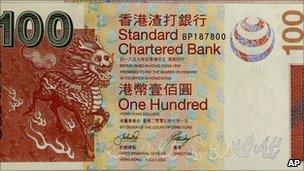Hong Kong dollar's future uncertain as yuan dominates
- Published

The future of the Hong Kong dollar is under spotlight as China pushes for bigger role for Yuan
The immediate trigger for the pegging of the Hong Kong dollar in 1983 was a currency collapse resulting from large capital outflows, due in turn to difficulties in the Sino-British negotiations over the future of Hong Kong after 1997.
However, at a deeper level the underlying cause of the currency crisis was Hong Kong's unsatisfactory monetary framework, lacking either an internal or external anchor.
During the decade 1974-83 the HK dollar was floating, but the Hong Kong authorities had no means of managing the internal quantity of money or inflation in Hong Kong because there was no central bank.
Consequently, both the quantity and price of the HK dollar varied widely, bringing high inflation and wide swings in the exchange rate.
The "linked" rate system was designed to address these problems.
Achievements
In broad terms the pegged rate for the HK dollar achieved its objectives. Inflation fell, even though at times it deviated from the US inflation rate, and the currency remained stable in line with the US dollar.
But every monetary system has costs and benefits.
On the benefits side, the virtue of the 1983 currency peg was that it was simple, compatible with existing institutional arrangements (such as private bank note issues), and rule-based.
It did not require discretionary operations by the monetary authorities, and would have been damaged by such interventions.
However, maintaining a successful peg required Hong Kong to fulfil a broader series of economic conditions.
For example, Hong Kong required a high degree of flexibility in prices, wages, and economic structure.
It also required a free flow of goods, services, and capital across international borders, strong financial supervision, and fiscal prudence.
By and large Hong Kong satisfied these conditions, and therefore the "linked" rate system worked remarkably well.
Hong Kong has adjusted rapidly to most external shocks.
Moreover, Hong Kong's peg to the US dollar has undoubtedly helped it become the premier international capital market in Asia.
On the cost side, critics assert that loss of monetary independence has damaged economic performance.
For example, after the Asian crisis of 1997-98, Hong Kong suffered several years of high unemployment and deflation.
Conversely, US interest rates - which are transmitted to Hong Kong by the peg - are currently too low for the vibrant economic conditions in Hong Kong, and this could threaten an asset bubble and inflation.
But the key question is: how much better would the Hong Kong economy perform under an alternative monetary system?
Looking at the experience of other small, open economies in the Asia-Pacific area, such as Singapore or Taiwan which have allowed their currencies to fluctuate against the US dollar, we find that those economies have not escaped the impact of global business cycle fluctuations.
For example, Singapore's GDP has been more volatile than Hong Kong's in recent years, and in Taiwan property prices have risen almost as much in the past five years as in Hong Kong.
So simply switching to a managed or floating exchange rate is not going to solve the problem.
Still relevant today?
Finally, what is the future for the HK dollar if the renminbi becomes fully convertible, that is, if China lifts capital controls?
First, even though the renminbi circulates in a limited way in Hong Kong, (6.3% of total deposits in January) it is likely to be many years before China adopts full convertibility.
Second, the Basic Law (which governs Hong Kong) specifies that the HK dollar will be the currency of Hong Kong until 2047.
Nevertheless, there is no doubt that China's economy will continue to grow rapidly over the next several decades, and therefore China will become a greater force in the global business cycle.
Will it then make sense for Hong Kong to shift its US dollar-peg to a renminbi-peg?
In my view the minimum conditions for the HK dollar to switch to a renminbi-peg would be:
The renminbi must be fully and irreversibly convertible on both current and capital account.
The renminbi must become an international reserve currency, allowing foreign companies and individuals freely to buy, hold and sell renminbi deposits and securities.
Financial markets in the Peoples Republic of China must develop to a point where interest rates are the primary tool of policy for the People's Bank of China, and also the primary driver of credit supply for lenders and borrowers. Only on this basis will Hong Kong's interest rate-based financial markets integrate well with mainland markets.
Hong Kong would also need to be confident that China's role as a driver of Hong Kong's business cycle would continue to exceed that of the United States.
Only on these conditions would it make sense for Hong Kong even to contemplate drastic changes to a currency system that has served the territory well for nearly three decades.
The opinions expressed are those of the author and are not held by the BBC unless specifically stated. The material is for general information only and does not constitute investment, tax, legal or other form of advice. You should not rely on this information to make (or refrain from making) any decisions. Links to external sites are for information only and do not constitute endorsement. Always obtain independent, professional advice for your own particular situation.